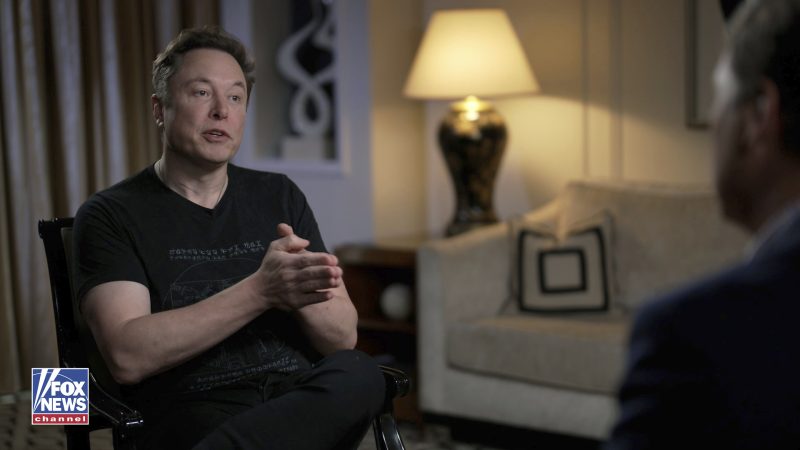Perhaps the best context in which to consider Tucker Carlson’s televised interview with Twitter owner-slash-car-and-rocket-guy Elon Musk was how energetically the Fox News host set up his audience for a major revelation about their shared political enemies.
The subject at hand was artificial intelligence, AI.
“The problem with AI is that it might control your brain through words,” Carlson said as he introduced a segment of the Musk interview. “And this is the application that we need to worry about now, particularly going into the next presidential election. The Democratic Party, as usual, was ahead of the curve on this. They’ve been thinking about how to harness AI for political power.”
More on that, he said, after the commercial break. So the break ended and Carlson told viewers that AI is “being used by politicians to control what you think, to end your independent judgment and erase democracy on the eve of a presidential election.”
Cut to the interview with Musk.
“What’s happening is they’re training the AI to lie,” Musk said. “It’s bad.”
“Yes!” Carlson replied. “To lie. That’s exactly right. And to withhold information.”
“To lie and … to either comment on some things and not comment on other things,” Musk said. “But not to say what the data actually demands that it say.”
Then there was a weird riff about some joke Musk stole from his friend but … that was it. That was the conversation.
For the uninitiated, what Musk and Carlson were talking about was a safeguard built into ChatGPT, the popular AI conversation tool. Ask it to opine on certain things and it will demur, using language explaining that is coded not to do so. It also has a predilection for heavy-handed articulations of the importance of remaining inoffensive and inclusive.
When the tool emerged a few months ago, there was a flurry of interest and, in a very human way, a probing of its limits. Users discovered, for example, that the tool’s prohibitions against being offensive meant it would opt for nuclear annihilation rather than use a racial slur. This obviously ludicrous result was touted by some on the right — including Musk, who is working on a competing product — to mock the tool and the “woke” moral code that was built into it.
But notice that there’s nothing about Democrats trying to throw the 2024 election. That’s all Carlson layering his own reflexes and terrors onto the thing, showing that it’s not only artificial intelligences that are unable to break free from bizarre, crippling intellectual constraints. Carlson took Musk’s modest (and themselves not apolitical) criticisms and turned them into part of the left’s grand plan to subsume the nation, as he does with everything.
That context is important for another accusation offered by Musk.
Carlson mentioned Musk’s purchase of Twitter last year. Upon taking control of the social media platform, Carlson prompted, Musk was “shocked to find out that various intel agencies were affecting its operations.”
“The degree to which various government agencies had effectively had full access to everything that was going on in Twitter blew my mind,” Musk replied. “I was not aware of that.”
“Would that include people’s [direct messages]?” Carlson asked, using the common shorthand “DM.”
“Yes, because the DMs are unencrypted,” Musk replied. “So one of the first, you know, one of the things that we’re about to release, its ability to encrypt your DMs.”
“That’s pretty heavy-duty, though, because a lot of well-known people, reporters talking to their sources, government officials, the richest people in the world, they’re DMing each other,” Carlson replied. “And the assumption — it obviously was incorrect, but was that that’s private. But that was being read by various governments?”
“Uh, yeah, that seems to be — yes,” Musk replied.
Let’s begin with Carlson’s assumption about the security of Twitter DMs. There probably were people who engaged in discussions over DM that they understood to be private but believed to be secure, conflating those two things in a way that they shouldn’t have. Perhaps some were world leaders or reporters, both of whom should know better. But this is not a failing of Twitter, as such. It’s a failing of those who made the assumption.
Information that travels over the internet is generally observable. Online retailers and secure communications platforms use encryption — digital obfuscation, if you will — to keep particular things from being observed. The most secure form of this encryption is end-to-end: when my message to you is encrypted on my device and unencrypted by you on yours, regardless of how or when it gets to you. Even if it’s sitting on Twitter’s (or anyone else’s) server waiting for you to pick it up, no one there can read what it says. But, as of now, that’s not how Twitter messages work.
(Incidentally, Musk’s mention that Twitter is working on end-to-end encryption, as sought by privacy advocates for years, isn’t itself new. The company has been working on an implementation since well before he assumed ownership of the company.)
Governments do legitimately dislike end-to-end encryption! They want messages sitting unencrypted on servers — not so they can come in and rifle around willy-nilly, but because they at times need to use those messages as evidence. If @hitman_1093457 and @client_290384 are DMing about an assassination plot, the FBI would like to subpoena Twitter for those communications and then be able to read them. If the two users had end-to-end encryption, the Feds have to gain access to one of their phones, a much more intrusive and risky step.
There are laws that govern how federal law enforcement can seek information from companies such as Twitter, including a mechanism for Twitter’s costs to be reimbursed. Twitter had traditionally provided public information on such requests (in the aggregate, not specifically) but hasn’t updated those metrics since Musk took over.
But notice that this is not how Carlson and Musk frame the conversation.
Once Musk gained control of Twitter, he began providing sympathetic writers with internal documents so they could craft narratives exposing the ways in which pre-Musk Twitter was complicit with the government and the left in nefarious ways. These were the “Twitter Files,” various presentations made on Twitter itself using cherry-picked and often misrepresented information.
One such presentation made an accusation similar to what Carlson was getting at: that the government paid Twitter millions of dollars to censor user information. That was how Musk presented that particular “Twitter File,” the seventh in the series, though this wasn’t true. The right-wing author of the thread focused on government interactions with social media companies in 2020 aimed at uprooting 2016-style misinformation efforts. His thread suggested through an aggregation of carefully presented documents that the government aimed to censor political speech. The author also pointedly noted that Twitter had received more than $3 million in federal funding, hinting that it was pay-to-play for censorship.
The insinuations were quickly debunked. The funding was, in reality, reimbursement to Twitter for compliance with the government’s subpoenaed data requests, as allowed under the law. The government’s effort — as part of the Trump administration, remember — did not obviously extend beyond curtailing foreign interference and other illegalities. But the narrative, boosted by Musk, took hold. And then was presented back to Musk by Carlson.
Notice that Musk doesn’t say that government actors were granted full, unlimited access to Twitter communications in the way that Carlson hints. His responses to Carlson comport fully with a scenario in which the government subpoenas Twitter for information and gets access to it in compliance with federal law. Or perhaps doesn’t! In Twitter’s most recent data on government requests, 3 in 10 were denied.
Maybe Musk didn’t understand that relationship between law enforcement and Twitter before buying the company, as he appears not to have understood other aspects of the company. Perhaps he was one of those rich people who assumed that because DMs were private they were secure — something he, a tech guy, should not have assumed, but who knows.
It’s certainly possible that there was illicit access from some government entity to Twitter’s data stores, perhaps in an ongoing fashion. But Carlson is suggesting (and Musk isn’t rejecting) an apparent symbiosis, in keeping with the misrepresented Twitter Files #7.
It is useful for Musk to have people think that he is creating a new Twitter that’s centered on free speech and protection of individual communications. That was his value proposition in buying it, after all. And it is apparently endlessly useful to Carlson to present a scenario to his viewers in which he and they are the last bastions of American patriotism, fending off government intrusions large and small and the robot-assisted machinations of the political left.
In each case, something is being sold to the audience. In Musk’s case, it’s a safe, bold, right-wing-empathetic Twitter. In Carlson’s, it’s the revelation of a dystopic America that must be tracked through vigilant observation each weekday at 8 p.m.
In neither case is the hype obviously a fair presentation of reality.



























